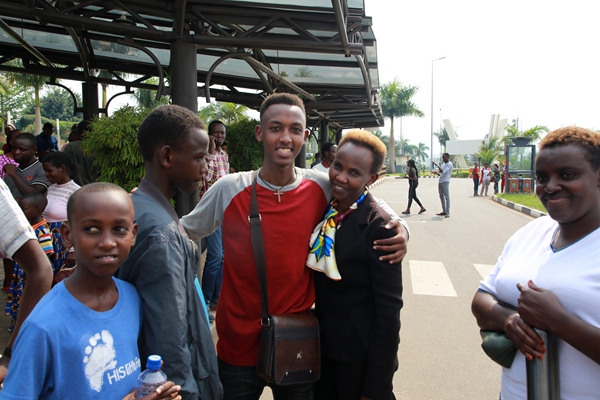Rwandans get lessons on internet commerce
Xinhua | Updated: 2019-09-25 08:06

A total of 22 students from Rwanda arrived in the eastern Chinese city of Hangzhou recently where Alibaba is headquartered to start their studies at the Alibaba Business School of the Hangzhou Normal University. They are the first batch of students taking the undergraduate cross-border e-commerce program for African students launched by the business school.
"You came at the right time and to the right place," said Zeng Ming, president of the business school at the opening ceremony.
The school is not a traditional business school, but one that focuses on the internet economy, says Zeng, adding that "foreign students can take courses related to the internet, global trade and cross-border e-commerce, and also gain firsthand experience of the development of China's digital economy".
One of the students, Mike Manzi, says: "This opportunity will change our lives."
The 18-year-old says he hopes, after graduation, to set up an e-commerce platform back in his country that helps simplify tax declarations and customs clearance for cross-border trade.
The program is part of an agreement between the Rwandan government and Alibaba under the latter's Electronic World Trade Platform initiative, or eWTP, which was launched in October 2018. Rwanda became the first African country to launch the platform.
Since the launch of the eWTP, Rwanda's coffee and tourism products have been sold on Alibaba's e-commerce platforms, including coffee from the Rwandan company Land of a Thousand Hills.
The eWTP demonstrates the development element of China's Belt and Road Initiative and helps connect the world through the internet, said Virgile Rwanyagatare, the charge d'affaires at the Rwandan embassy in China, at the ceremony.
China sells goods to the world through e-commerce, and African countries will soon be able to connect to these online platforms, says Rwanyagatare.
To many Rwandan students like Manzi, the eWTP is an opportunity for them. And Manzi says he believed the initiative will help the development of his country in terms of economy and e-commerce.
Rwanda wants to be a middle-income nation by embracing digitization and smart business transactions through the eWTP, says Sanny Ntayombya, the head of communications and marketing at Rwanda Development Board, in a written interview with Xinhua. The prospects of the eWTP are high in Rwanda, says Ntayombya, and the country hopes the partnership results in more trade with China and the world.
Speaking about the program, Huang Mingwei, vice-president of Alibaba, says: "With a four-year systematic learning program, we hope Rwandan students can integrate into China's digital economy and become a backbone for Rwanda after graduation."
Over the past year, the company has provided e-commerce training for officials, business owners, entrepreneurs, and college teachers from Rwanda. And it has jointly developed e-commerce courses with the African Leadership University in the African country.
Rwanyagatare says he expects the students to become leaders and develop successful businesses in the future and to teach people back home what they have learned in China.
























